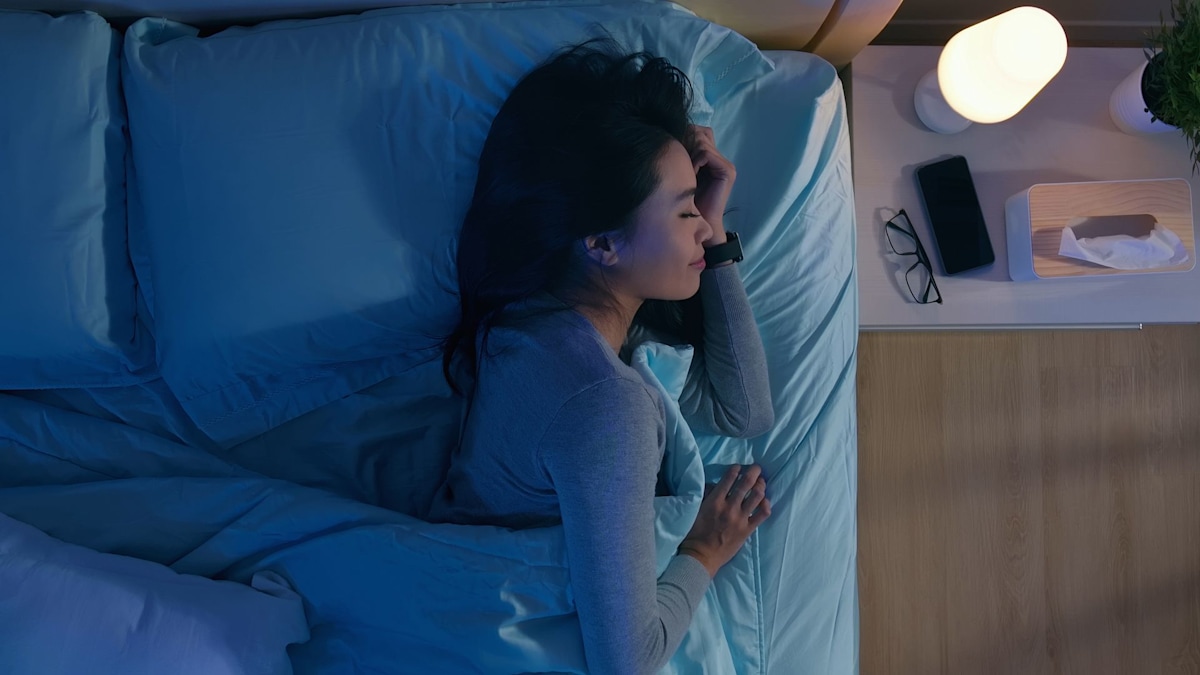Health
Study Reveals Phone Use Linked to Sleep Issues and Brain Fog

Recent research indicates that the average person in Britain spends over three hours daily on their mobile phone, often keeping it close even during sleep. This constant connectivity raises concerns about potential impacts on mental clarity and overall well-being. Dr. Anna Persaud, CEO of This Works, provides insights into how phone usage may contribute to feelings of fatigue and “brain fog.”
Keeping a phone near the bed can significantly disrupt sleep quality. Dr. Persaud explains that the blue light emitted from screens inhibits the production of melatonin, the hormone responsible for regulating sleep-wake cycles. This suppression can lead to difficulties falling asleep and diminish the quality of sleep achieved.
The content accessed on phones also affects sleep. Engaging with social media, news, and emails can stimulate the brain at a time when it should be winding down. Dr. Persaud notes, “The anticipation of notifications can keep your mind on high alert, preventing you from reaching the deeper, more restorative stages of sleep.” Over time, this pattern can result in decreased sleep efficiency, contributing to increased fatigue and stress the following day.
To safeguard sleep quality, Dr. Persaud recommends leaving phones outside the bedroom. She highlights that many parents implement this rule for their children, suggesting adults should consider the same approach.
Creating Healthy Bedtime Routines
Dr. Persaud advocates for a “screen-free wind-down window” lasting at least one hour before bedtime. If this isn’t feasible, she advises using your phone’s ‘Night Shift’ or ‘Blue Light Filter’ mode in the evening, along with activating ‘Do Not Disturb.’
Establishing a consistent bedtime routine can signal the body and mind that it’s time to rest. This might include dimming lights to reduce stimulation and engaging in self-care rituals, such as warm baths or massages. Dr. Persaud recommends incorporating This Works products, like the Deep Sleep Body Whip or Deep Sleep Pillow Spray, which contain calming essential oils like lavender, chamomile, and vetiver. These ingredients are known for their ability to alleviate sleep anxiety.
Breaking Phone Dependency
Many individuals feel a strong attachment to their phones, often using them for late-night updates. However, Dr. Persaud emphasizes that this mental stimulation can sabotage sleep quality. To shift habits, she suggests creating a gradual transition from digital engagement to relaxation. Setting a recurring alarm an hour before bed can serve as a reminder to start your wind-down routine.
Charging your phone in another room or using an analogue alarm clock can also help reduce reliance on your device. Dr. Persaud encourages replacing screen time with calming activities, such as reading a book that is engaging yet not overly stimulating.
“Habit-stacking”—where you perform these actions consistently at the same time each night—can help make them second nature. Dr. Persaud reminds individuals that breaking a dependency on their phones takes time and patience. “If you slip, try not to give up. Start again the following night. Small, consistent changes add up to better sleep over time,” she advises.
Ultimately, improving sleep is a process that requires attention and consistency. By understanding the impact of mobile phone usage on sleep quality, individuals can take proactive steps to enhance their overall health and well-being.
-

 Entertainment2 months ago
Entertainment2 months agoIconic 90s TV Show House Hits Market for £1.1 Million
-

 Lifestyle4 months ago
Lifestyle4 months agoMilk Bank Urges Mothers to Donate for Premature Babies’ Health
-

 Sports3 months ago
Sports3 months agoAlessia Russo Signs Long-Term Deal with Arsenal Ahead of WSL Season
-

 Lifestyle4 months ago
Lifestyle4 months agoShoppers Flock to Discounted Neck Pillow on Amazon for Travel Comfort
-

 Politics4 months ago
Politics4 months agoMuseums Body Critiques EHRC Proposals on Gender Facilities
-

 Business4 months ago
Business4 months agoTrump Visits Europe: Business, Politics, or Leisure?
-

 Lifestyle4 months ago
Lifestyle4 months agoJapanese Teen Sorato Shimizu Breaks U18 100m Record in 10 Seconds
-

 Politics4 months ago
Politics4 months agoCouple Shares Inspiring Love Story Defying Height Stereotypes
-

 World4 months ago
World4 months agoAnglian Water Raises Concerns Over Proposed AI Data Centre
-

 Sports4 months ago
Sports4 months agoBournemouth Dominates Everton with 3-0 Victory in Premier League Summer Series
-

 World4 months ago
World4 months agoWreckage of Missing Russian Passenger Plane Discovered in Flames
-

 Lifestyle4 months ago
Lifestyle4 months agoShoppers Rave About Roman’s £42 Midi Dress, Calling It ‘Elegant’









